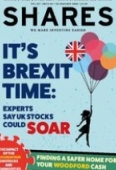Archived article
Please note that tax, investment, pension and ISA rules can change and the information and any views contained in this article may now be inaccurate.
How the coronavirus might impact your investments

After a promising start to 2020, the markets are reeling from the outbreak of the Chinese coronavirus and the impact the deadly virus could have on the global economy.
As we write the FTSE 100 is trading at its lowest levels since mid-December as investors look for clarity on just how serious the outbreak could get and when and how it will be contained.
What has happened?
Around the turn of the year news emerged from China of several cases of pneumonia in Wuhan, centred on its seafood market. By 7 January health officials had identified a new virus and on 11 January the country announced its first death. By 13 January the World Health Organisation reported the first case outside China.
The death toll has subsequently risen above 100 and Chinese authorities have imposed travel restrictions in an attempt to contain the outbreak.
How and why is it affecting markets?
Since human-to-human transmission of the virus was confirmed global equities have tumbled, with falls for major indices ranging from 2% to 4%.
The Australian dollar has suffered given the proximity of the country to the crisis and the impact on tourism so soon after the devastating bush fires in December and January. Oil prices are also under pressure, hitting a three-month low.
Shutting down transport and imposing quarantine conditions will inevitably have an impact on economic activity domestically in
China and will likely to impact on trade with the rest of the world. A downgrade to Chinese first quarter GDP looks inevitable and curtailed movement of people and diminished trade
could hit global oil demand.
What can we learn from previous outbreaks?
Given it also originated in China the SARS epidemic of the early noughties provides a useful point of comparison.
Canaccord Genuity Wealth Management chief investment officer Michael Perera says: ‘SARS – responsible for 800 deaths – lasted for two quarters and clipped Chinese economic growth by 2%. At the time that was from 11.5% to 9.5%, but with growth today in the 6% range, a 2% haircut would be damaging to world growth.’
In the first quarter of 2003 when the SARS outbreak was at its height, Hong Kong’s Hang Seng index fell 7.5%, although it rebounded quickly once the number of cases peaked.
An attempt back then by Chinese authorities to cover up the scale of SARS contributed to market panic but there appears to be greater transparency and more rapid action this time round.
There have been suggestions the coronavirus is contagious in the incubation period when no symptoms are displayed which could make it more difficult to contain then SARS or Ebola.
What could happen next and how might equities respond?
At the time of writing the World Health Organisation had yet to declare a public health emergency. If it were to do so then there would likely be a more pronounced market impact as investors could price in more widespread restrictions on global travel and trade.
So far the number of cases outside of China is relatively modest but a material increase could also escalate the sell-off in equities. On 28 January the first case of human-to-human transmission in Europe was recorded in Germany.
Which stocks and sectors are exposed to the crisis?
The UK stock market as a whole arguably has greater exposure to the crisis than some of its counterparts in developed economies, given the strong weighting towards resources stocks. China’s heavy consumption of commodities means its fortunes are closely tied to this part of the market.
A look at the worst performing FTSE 100 stocks since close on 17 January is populated by several mining stocks, with tourism and travel-related firms like International Consolidated Airlines (IAG) and cruise operator Carnival (CCL) joining them in the firing line.
Luxury goods brand Burberry (BRBY) has also sold off as China is a very important market for the company specifically and the luxury market more widely.
Relevant investment trusts like Fidelity China Special Situations (FCSS), down 10.3% to 225p over the same timeframe, have also come under pressure.
Healthcare stocks are a potential beneficiary of the outbreak. For example, Japanese surgical mask maker Kawamoto has soared as sales of masks have surged in cities across Asia.
US-listed Inovio Pharmaceuticals and Novavax have announced plans to develop vaccines against the coronavirus which temporarily gave their respective share prices a lift, while Chinese health-related shares have also rallied.
Important information:
These articles are provided by Shares magazine which is published by AJ Bell Media, a part of AJ Bell. Shares is not written by AJ Bell.
Shares is provided for your general information and use and is not a personal recommendation to invest. It is not intended to be relied upon by you in making or not making any investment decisions. The investments referred to in these articles will not be suitable for all investors. If in doubt please seek appropriate independent financial advice.
Investors acting on the information in these articles do so at their own risk and AJ Bell Media and its staff do not accept liability for losses suffered by investors as a result of their investment decisions.

 magazine
magazine











